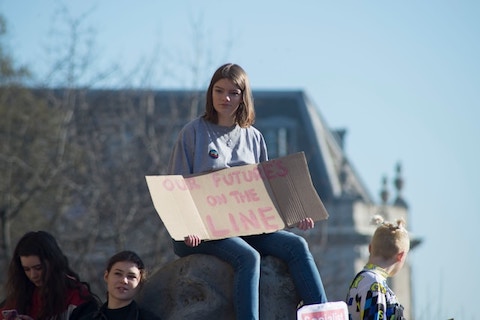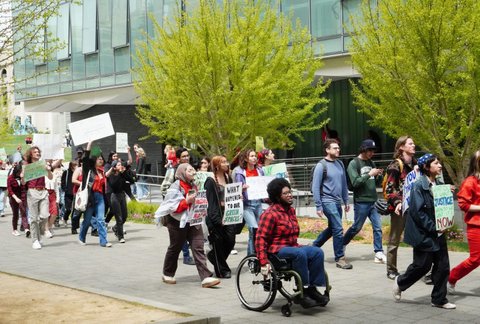
04 Feb The Politics of Influence: How Families and Algorithms Guide Youth Opinions

With so much at stake for young people these days, where do they get their political opinions from? (Photo by Josh Barwick on Unsplash)
Commentary, Gabbie Munoz
In 2020, when Donald Trump first ran for reelection, youth voter turnout rose significantly. However, in the 2024 election, with Trump back on the ballot, youth participation dropped. In recent years, we’ve seen more young people express their political opinions, advocate for their beliefs, and protest what they oppose. Yet, many still don’t trust or believe in the political process.
A January report from the Center for Information & Research on Civic Learning and Engagement at Tufts University estimated that 42% of people aged 18-29 voted in the 2024 general election, following historically high youth voter turnout of over 50% in 2020. The report revealed that some young people didn’t vote because they felt ignored by campaigns or lacked support to cast their ballots, while others were simply uninterested or did not like the candidates.
>>>Election 2024:
Young Voters Like Me Have a Lot to Weigh This Election<<<
Whether engaged or disillusioned, it’s essential to understand how young people form their political opinions so quickly.
Our families play a key role in shaping our moral compass, religious practices, and now our political spectrum. This became clear to me in high school, and as I’ve grown older, I’ve come to realize that this influence is evident on both sides of the political spectrum.
Conservatives criticize liberals, and liberals do the same to conservatives. We’re all aware of this divide, but why are youth playing into these stereotypes? I believe it once again goes back to our families.
In my senior government class at Liberty High, we often discussed presidents, the economy, and how our government works. But one day, a debate broke out about Ronald Reagan. A few students voiced their dislike of him, while others supported him. What stood out to me was one student’s comment in defense of Reagan: “Well, my uncle likes him.”
>>>Read: This Teacher Changed How I See Government, History and My Future<<<
This moment highlighted something I’ve noticed: Young people are heavily influenced by the views of their families. Most parents and relatives will often tell the youth in their lives about the things they lived through, their opinions, and the news they consume, which inevitably shapes how young people see the other side and are going to react to the opinions of the people around them.
I can’t count how many times I’ve come across people my age, or even younger, arguing in comment sections, or making videos purposefully to upset people with opposing views. Every time I do, it makes me wonder why they feel the need, I think it’s because of the way that these things are treated in the household.
I’ve seen it firsthand — my Republican-leaning brother often says things just to provoke the family, proudly declaring that “Democrats are stupid.” Similarly, a friend’s parents deliberately say things about liberals to get under her skin.
This isn’t just about family dynamics; it’s about a broader culture of ignorance and intolerance, often passed down from one generation to the next. And now, in the digital age, social media plays a significant role. The algorithms on apps like TikTok show young people content that aligns with what they’ve already engaged with, creating a feedback loop that reinforces their existing beliefs.
What if this is also playing a part in why so many kids are falling into political parties that they don’t really know anything about?
They’re being fed one-sided narratives, with little exposure to differing or opposing viewpoints. This applies to both sides of the political spectrum, and is especially true on platforms like TikTok, where videos often praise one side while demonizing the other.
>>>From Our Archives:
Social Media’s Influence on the News: Don’t Believe Everything You Read on the Internet<<<
How can young people learn to think critically about politics if all they’re exposed to is content that caters to their existing views?
It’s important to ask ourselves: What’s the point of hating the other side? We can disagree, obviously. There are going to be many things that we will never see eye to eye on, but where does it get us when we refuse to communicate with one another or find common ground?
We’ve seen the consequences of this lack of dialogue in our government, where partisan gridlock has led to inaction. Our country is divided, and it’s holding us back. As young people, we have a responsibility to bridge the gap and show that communication doesn’t have to be this difficult.
>>>Youth Vote:
‘My Simple Existence Is Political’: Why Voting Matters to Me at 19<<<
We are still learning and figuring things out. So why should we direct so much hate at others who are on the same journey? We have the power to change the narrative, but it starts with a willingness to listen.
We don’t always have to agree with what our parents say, and we most certainly don’t have to align ourselves with the same political party as them.
I think it’s important to do your own research and try to find out what you truly believe in without the influence of those around you.
People will always try to get us to be the same as them but remember that you don’t have to be. There’s nothing wrong with trying to find things out for yourself and forming your own opinions.






No Comments